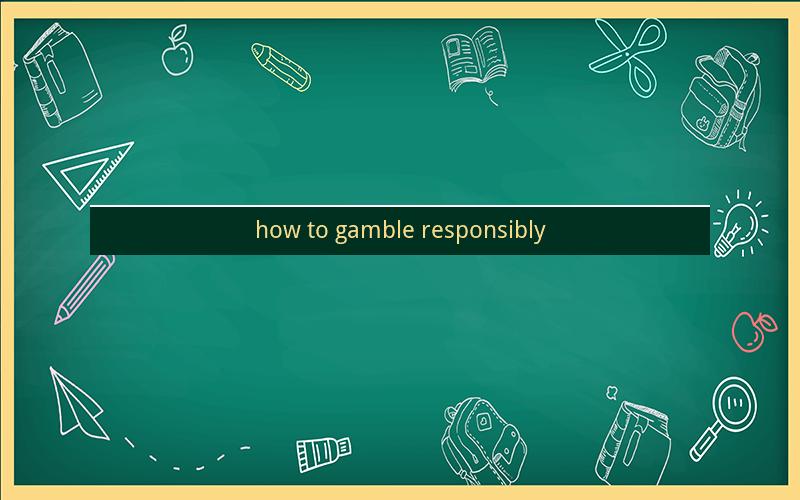
Directory
1. Understanding Responsible Gambling
2. Identifying Problem Gambling
3. Setting Limits and Budgeting
4. The Importance of Self-Exclusion
5. The Role of Education in Responsible Gambling
6. The Impact of Social and Cultural Factors
7. The Role of Technology in Responsible Gambling
8. Resources for Responsible Gamblers
9. Encouraging a Supportive Environment
10. Conclusion
1. Understanding Responsible Gambling
Responsible gambling involves making informed choices about when, where, and how much to gamble. It is crucial to recognize the potential risks and consequences associated with gambling activities. By understanding these factors, individuals can maintain control over their gambling habits and ensure that it remains a recreational activity rather than a harmful addiction.
2. Identifying Problem Gambling
Problem gambling can manifest in various ways, including financial, emotional, and social problems. Recognizing the signs of problem gambling is the first step towards responsible gambling. These signs include:
- Preoccupation with gambling, including thoughts about when and how to gamble.
- Needing to increase the amount of money or time spent gambling to achieve the same thrill.
- Feelings of guilt or remorse after gambling, especially if it leads to financial or personal difficulties.
- Attempting to control or stop gambling, but being unsuccessful.
- Gambling to escape problems or negative emotions.
3. Setting Limits and Budgeting
One of the most effective ways to ensure responsible gambling is to set clear limits and stick to them. This includes:
- Determining a budget for gambling activities and sticking to it.
- Setting time limits for how long to gamble.
- Knowing when to stop, even if on a winning streak.
4. The Importance of Self-Exclusion
Self-exclusion is a powerful tool for those who struggle with problem gambling. It involves asking casinos or online gambling platforms to restrict access to their services. This can be a temporary or permanent measure, depending on the individual's needs.
5. The Role of Education in Responsible Gambling
Education plays a crucial role in promoting responsible gambling. By understanding the odds, risks, and potential consequences of gambling, individuals can make informed decisions. Educational resources, including workshops, seminars, and online materials, can help individuals develop a better understanding of responsible gambling.
6. The Impact of Social and Cultural Factors
Social and cultural factors can significantly influence gambling behaviors. For example, certain cultures may view gambling as a form of entertainment or even a way to socialize. Understanding these factors can help individuals recognize when their gambling habits may be becoming problematic.
7. The Role of Technology in Responsible Gambling
Technology has both positive and negative impacts on responsible gambling. On one hand, it provides easy access to gambling platforms, which can increase the risk of problem gambling. On the other hand, technology can also be used to promote responsible gambling, such as through self-exclusion tools and time management apps.
8. Resources for Responsible Gamblers
Several resources are available for individuals who want to learn more about responsible gambling or seek help for problem gambling. These resources include:
- Gamblers Anonymous: A support group for individuals with problem gambling.
- National Council on Problem Gambling: A resource for information and support.
- Online gambling forums: Platforms where individuals can discuss their experiences and find support.
9. Encouraging a Supportive Environment
Creating a supportive environment is essential for responsible gambling. This can be achieved by:
- Encouraging open discussions about gambling habits and their effects.
- Promoting self-help groups and support networks.
- Providing educational materials and resources.
10. Conclusion
Responsible gambling is a crucial aspect of maintaining a healthy and balanced lifestyle. By understanding the risks, setting limits, seeking support, and promoting a supportive environment, individuals can enjoy gambling responsibly.
Questions and Answers
1. Question: What are the signs of problem gambling?
Answer: Signs of problem gambling include preoccupation with gambling, increasing the amount of money or time spent gambling, feelings of guilt or remorse, and unsuccessful attempts to control or stop gambling.
2. Question: How can I set a budget for gambling activities?
Answer: Set a budget by determining the amount of money you are comfortable spending on gambling and stick to it, regardless of the outcomes.
3. Question: What is self-exclusion and how can it help?
Answer: Self-exclusion is a process where individuals request casinos or online gambling platforms to restrict their access. It can help prevent problem gambling by removing the temptation to gamble.
4. Question: How can education help promote responsible gambling?
Answer: Education helps individuals understand the risks and odds associated with gambling, enabling them to make informed decisions and maintain control over their gambling habits.
5. Question: What resources are available for individuals with problem gambling?
Answer: Resources include Gamblers Anonymous, the National Council on Problem Gambling, and online gambling forums.
6. Question: How can technology be used to promote responsible gambling?
Answer: Technology can be used to promote responsible gambling through self-exclusion tools, time management apps, and educational resources.
7. Question: What role do social and cultural factors play in gambling behavior?
Answer: Social and cultural factors can influence how individuals view and engage in gambling, potentially increasing the risk of problem gambling.
8. Question: How can I create a supportive environment for responsible gambling?
Answer: Encourage open discussions about gambling, promote self-help groups, and provide educational materials to foster a supportive environment.
9. Question: What are some effective strategies for setting limits in gambling?
Answer: Set a budget, determine time limits, and know when to stop gambling, even if on a winning streak.
10. Question: Why is it important to understand the risks of gambling?
Answer: Understanding the risks helps individuals maintain control over their gambling habits, ensuring that gambling remains a recreational activity rather than a harmful addiction.